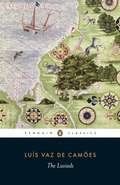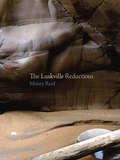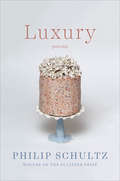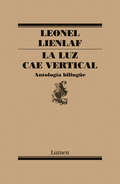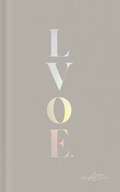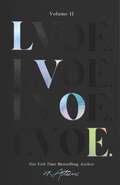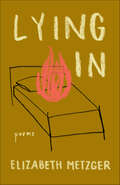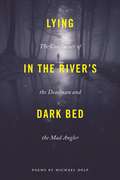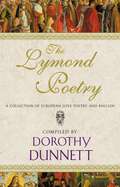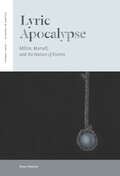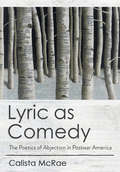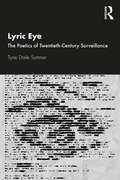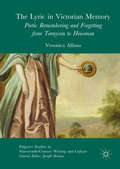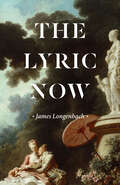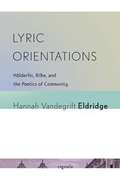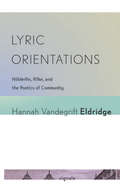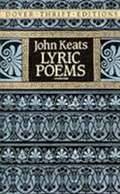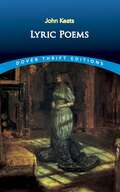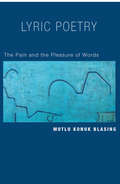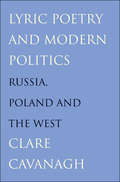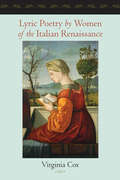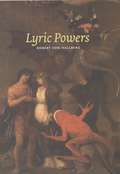- Table View
- List View
The Lusiads
by Luis Vaz de Camões William AtkinsonFirst published in 1572, The Lusiads is one of the greatest epic poems of the Renaissance, immortalizing Portugal's voyages of discovery with an unrivalled freshness of observation. At the centre of The Lusiads is Vasco da Gama's pioneer voyage via southern Africa to India in 1497-98. The first European artist to cross the equator, Camoes's narrative reflects the novelty and fascination of that original encounter with Africa, India and the Far East. The poem's twin symbols are the Cross and the Astrolabe, and its celebration of a turning point in mankind's knowledge of the world unites the old map of the heavens with the newly discovered terrain on earth. Yet it speaks powerfully, too, of the precariousness of power, and of the rise and decline of nationhood, threatened not only from without by enemies, but from within by loss of integrity and vision.
The Luskville Reductions
by Monty ReidA book of lyrics, fragmented, extended, and recovered, which read as a single long poem. The Luskville Reductions records a year in the life of a small Quebec town and the marriage that disintegrates there. While a book about loss, it is also a book about the state of becoming that coexists with change, the imbalance that for a time makes everything lucid, all the details adding up to much more than only an "us." The visible goes beyond mere facts in these poems, transformed into the deeply seen - and therefore sacred. The problem with daylilies is the usual contemporary twaddle: how is it we know anything now that you're gone. What do you mean now that you're gone? What do you mean daylilies? "Marry the passionate grief of By Grand Central Station I Sat Down and Wept with the pared-down utterances of Beckett's lost men and you might arrive at The Luskville Reductions. While it evokes the dark cry of the lover in ‘O Western Wind,' this long poem is entirely contemporary in its ontological alertness, its wry ironies. At once threnody and enactment of loss, it brings something utterly new into the corpus of Canadian poetry. It is a brilliantly achieved poem." -- Mary Dalton
Luxury: Poems
by Philip Schultz"Philip Schultz’s poems have long since earned their own place in American poetry. His stylistic trademarks are his great emotional directness and his intelligent haranguing—of god, the reader, and himself. He is one of the least affected of American poets, and one of the fiercest." —Tony Hoagland In this compassionate new collection, Philip Schultz’s wry and incisive poetic voice takes on both the eternal questions of meaning and happiness and essentially modern complexities—the collective power of women’s marches, the strangeness of googling oneself, the refugee crisis, the emotions associated with visiting the 9/11 memorial. At once philosophical and droll, Schultz explores life’s luxuries and challenges with masterly precision. Luxury takes its name from the center poem, which has an ironic ring next to Schultz’s Pulitzer Prize–winning collection Failure. The poem is a beautiful exploration of the pull toward life as Schultz examines the question of suicide, intimately probing a familial pull toward that darkness and weaving in the philosophy of Albert Camus and the voices and legacies of Paul Celan and Ernest Hemingway. Using humor, irony, and celebration as ballast against the book’s darker forces, Luxury explores the comfort and sustenance of life, the bittersweet clarity of aging, and the anxiety of existence. From "Greed": Happiness, I used to think, was a necessary illusion. Now I think it’s just precious moments of relief
Luz cae vertical: Antología bilingüe
by Leonel LienlafAntología bilingüe mapuzungun y castellano de una de las voces más delicadas de la poesía mapuche Con cuatro libros en treinta años, Leonel Lienlaf ha construido una obra poética admirable. Desde Se ha despertado el ave de mi corazón, su premiado primer libro, escrito a los 18 años, hasta el enigmático Epu Zuam, Lienlaf ha urdido un arte verbal que, con delicadas imágenes y evocaciones, proyecta algunos rasgos esenciales de la cultura mapuche, como la incidencia clave de los sueños en las decisiones vitales, las luchas históricas o el protagonismo shakesperiano del paisaje y la naturaleza en el destino humano. Esta antología incluye una selección de sus cuatro libros publicados, así como una quincena de poemas inéditos o dispersos.
LVOE: Poems, Epigrams & Aphorisms
by AtticusFrom the internationally bestselling author of Love Her Wild, The Dark Between Stars, and The Truth About Magic comes LVOE., a dazzling new journey into the great unknown by Atticus. Featuring over 250 brand new poems, this sees Atticus take his readers on an enthralling, unforgettable new adventure. For the first time since he began writing, three-time New York Times bestselling author Atticus is inviting readers to take a look behind the mask as he embarks on a powerful journey inward in search of love, peace, and acceptance.His fourth poetry collection, LVOE., is a study into himself. Using his instantly recognisable lyrical style, gorgeous black-and-white illustrations, and relatable themes, Atticus will once again dazzle readers, inspiring them to also look within. This collection will feature all-new poems, each paired with beautiful sketches that bring the words alive from the page.An exploration of self-love, meditation, meaning, loss, and romance, LVOE. is a look forward, a look backward, but most importantly a look inward to the often confusing yet hopeful human experience.
LVOE II
by AtticusIn the highly anticipated follow-up to LVOE: Poems, Epigrams & Aphorisms, three-time New York Times bestselling author Atticus is inviting readers to take a deeper look behind the mask as he continues his powerful journey inward in search of love, peace, and acceptance.LVOE. Volume II is an expanded exploration of self-love, meditation, meaning, loss, and romance from the internet's favourite poet. Atticus implores his instantly recognizable lyrical style, gorgeous illustrations, and relatable themes to once again dazzle readers, inspiring them to look within. This collection will feature all-new poems, each paired with beautiful sketches that bring the words alive from the page.LVOE. Volume II looks forward, backward, but most importantly inward to the often confusing yet hopeful human experience.
Lying In: Poems
by Elizabeth MetzgerA devastating, vulnerable collection tracing high-risk pregnancy and new motherhood amid grief.“All my life all I’ve wanted was to be myself / and someone else,” writes Elizabeth Metzger. From the shadowy perspective of confinement, where the presence of death unsettles all outcomes, these poems examine an expansion and fracturing of the self—into motherhood as well as childhood, into past selves and future unknowns. The child becomes parent, the parent becomes child, the child arrives but in doing so is lost. New loss haunts new life, and life becomes “one or two lives.” The door is more valuable than the prize behind it.With ambivalence as well as deep feeling, Metzger wonders how a single body can be expected to hold both immense joy and immense mourning, profound longing and creeping numbness, when one so often overtakes the other. She plunges into the darkness inside—of the gloomy room, the inner body, the afterlife and the pre-language mind—and sends back “a searchlight across the underworld,” Eurydice in search of herself.Aching and contemplative, Lying In is an exquisite portrait of an in-between time—and of the person who emerges on the other side. “Isn’t it obvious how we’ve changed?”
Lying in the River's Dark Bed: The Confluence of the Deadman and the Mad Angler (Made in Michigan Writers Series)
by Michael DelpLying in the River's Dark Bed: The Confluence of the Deadman and the Mad Angler by Michael Delp is a collection of fifty-six poems that brings together two characters Delp has been perfecting for years: Deadman and the Mad Angler. The Deadman, a spirit that constantly shifts, is one part troublemaker, one part truth-teller, and one part demon who demands respect. The Mad Angler, on the other hand, could be called the Mad Shaman or Mad Activist, as he speaks of the water and nature and then of the greed of man. While these two personas are distinct in the collection (highlighted beautifully in the unique double-sided book design) they also come together at times in perfect harmony. The Deadman and the Mad Angler are walking contradictions--twin sons of different mothers. The Deadman is a trickster figure, a hive of contradictions. He can be killed but cannot die. He is supremely intelligent, yet is as dumb as a stone. He is an enigma to himself and to all others, yet he understands the origins and the meanings of the inner lives of all things. He is impossible to understand, yet somehow through his musings enlightenment occurs. His poems inspire contentedness, even though they might frighten you first in order to do so. The Mad Angler is more finely tuned, focused primarily on the environment. He exercises more restraint and resistance than his scattered brother, focusing on nature and on what is flowing in the water around him and inside of him. His voice is sure and firm on all things water related because he is as much river as person. The collection embraces these voices as separate and unique identities, while highlighting a center section called "Confluence," the place where these two come together to meditate on some of the most profound emotions evoked by the contemporary world. Lying in the River's Dark Bed reflects the compatibilities and contradictions of the natural world. These ritualized poems are both funny and thought provoking and an example of persona writing at its best. Those interested in conversational poetry and environmental writing will be enthralled with this stirring yet soothing collection.
The Lymond Poetry
by Dorothy Dunnett Elspeth MorrisonA beautiful collection of Renaissance poetry, assembled by one of the world's finest historical novelists.Dorothy Dunnett died in November 2001. She left behind this anthology, chosen by her from the hundreds of poems which she used in her world-famous series of novels known as THE LYMOND CHRONICLES. It is a fascinating set of choices, featuring Thomas Wyatt, King James I, extracts from the Psalms, and even an anonymous poem called 'Monologue of a Drunkard' - as Dorothy herself writes, here in one volume is 'the poetry of love, of folk-humour and ballad, the songs of Persian poets and of the troubadours, translated where need be into English.'
Lyric Apocalypse: Milton, Marvell, and the Nature of Events (Verbal Arts: Studies in Poetics)
by Ryan NetzleyWhat’s new about the apocalypse? Revelation does not allow us to look back after the end and enumerate pivotal turning points. It happens in an immediate encounter with the transformatively new.John Milton’s and Andrew Marvell’s lyrics attempt to render the experience of such an apocalyptic change in the present. In this respect they take seriously the Reformation’s insistence that eschatology is a historical phenomenon. Yet these poets are also reacting to the Regicide, and, as a result, their works explore very modern questions about the nature of events, what it means for a significant historical occasion to happen.Lyric Apocalypse argues that Milton’s and Marvell’s lyrics challenge any retrospective understanding of events, including one built on a theory of revolution. Instead, these poems show that there is no “after” to the apocalypse, that if we are going to talk about change, we should do so in the present, when there is still time to do something about it. For both of these poets, lyric becomes a way to imagine an apocalyptic event that would be both hopeful and new.
Lyric as Comedy: The Poetics of Abjection in Postwar America
by Calista McRaeA poet walks into a bar... In Lyric as Comedy, Calista McRae explores the unexpected comic opportunities within recent American poems about deeply personal, often embarrassing, experiences. Lyric poems, she finds, can be surprising sites of a shifting, unruly comedy, as seen in the work of John Berryman, Robert Lowell, A. R. Ammons, Terrance Hayes, Morgan Parker, Natalie Shapero, and Monica Youn. Lyric as Comedy draws out the ways in which key American poets have struggled with persistent expectations about what expressive poetry can and should do. McRae reveals how the modern lyric, rather than bestowing order on the poet's thoughts and emotions, can center on impropriety and confusion, formal breakage and linguistic unruliness, and self-observation and self-staging. The close readings in Lyric as Comedy also provide new insight into the theory and aesthetics of comedy, taking in the indirect, glancing comic affordances of poetry. In doing so, McRae captures varieties of humor that do not align with traditional terms, centering abjection and pleasure as facets of contemporary lyric practice.
Lyric Eye: The Poetics of Twentieth-Century Surveillance
by Tyne Daile SumnerLyric Eye: The Poetics of Twentieth-Century Surveillance presents the first detailed study of the relationship between poetry and surveillance. It critically examines the close connection between American lyric poetry and a burgeoning U.S. state surveillance apparatus from 1920 to the 1960s. The book explores the myriad ways that poets—Ezra Pound, William Carlos Williams, W.H. Auden, Langston Hughes, James Baldwin, Sylvia Plath, Gertrude Stein, Robert Lowell, Allen Ginsberg and others—explored a developing and fraught environment in which the growing power of American investigative agencies, such as the FBI under J. Edgar Hoover, imposed new pressures on cultural discourse and personal identity. In analysing twentieth-century American poetry and its various ideas about "the self," Lyric Eye demonstrates the extent to which poetry and surveillance employ similar styles of information gathering such as observation, overhearing, imitation, abstraction, repurposing of language, subversion, fragmentation and symbolism. Ground-breaking and prescient, this book will be of great interest to scholars and researchers of literature, politics, surveillance and intelligence studies, and digital humanities.
The Lyric in the Age of the Brain
by Nikki SkillmanScience has transformed understandings of the mind, supplying physiological explanations for what once seemed transcendental. Nikki Skillman shows how lyric poets--caught between a reductive scientific view and naïve literary metaphors--struggled to articulate a vision of consciousness that was both scientifically informed and poetically truthful.
Lyric in the Renaissance
by Ullrich LangerMoving from a definition of the lyric to the innovations introduced by Petrarch's poetic language, this study goes on to propose a new reading of several French poets (Charles d'Orléans, Ronsard, and Du Bellay), and a re-evaluation of Montaigne's understanding of the most striking poetry and its relation to his own prose. Instead of relying on conventional notions of Renaissance subjectivity, it locates recurring features of this poetic language that express a turn to the singular and that herald lyric poetry's modern emphasis on the utterly particular. By combining close textual analysis with more modern ethical concerns this study establishes clear distinctions between what poets do and what rhetoric and poetics say they do. It shows how the tradition of rhetorical commentary is insufficient in accounting for this startling effectiveness of lyric poetry, manifest in Petrarch's Rime Sparse and the collections of the best poets writing after him.
The Lyric in Victorian Memory
by Veronica AlfanoThis book is a study of nineteenth-century poems that remember, yearn for, fixate on, and forget the past. Reflecting the current critical drive to reconcile formalist and historicist approaches to literature, it uses close readings to trace the complex interactions between memory as a theme and the (often-memorable) formal traits - such as brevity, stanzaic structure, and sonic repetition - that appear in the lyrics examined. This book considers the interwoven nature of remembering and forgetting in the work of four Victorian poets. It uses this theme to shed new light on the relationship between lyric and narrative, on the connections between gender and genre, and on the way in which Victorians represented and commemorated the past.
The Lyric Now
by James LongenbachFor more than a century, American poets have heeded the siren song of Ezra Pound’s make it new, staking a claim for the next poem on the supposed obsolescence of the last. But great poems are forever rehearsing their own present, inviting readers into a nowness that makes itself new each time we read or reread them. They create the present moment as we enter it, their language relying on the long history of lyric poetry while at the same time creating a feeling of unprecedented experience. In poet and critic James Longenbach’s title, the word “now” does double duty, evoking both a lyric sense of the present and twentieth-century writers’ assertion of “nowness” as they crafted their poetry in the wake of Modernism. Longenbach examines the fruitfulness of poetic repetition and indecision, of naming and renaming, and of the evolving search for newness in the construction, history, and life of lyrics. Looking to the work of thirteen poets, from Marianne Moore and T. S. Eliot through George Oppen and Jorie Graham to Carl Phillips and Sally Keith, and several musicians, including Virgil Thomson and Patti Smith, he shows how immediacy is constructed through language. Longenbach also considers the life and times of these poets, taking a close look at the syntax and diction of poetry, and offers an original look at the nowness of lyrics.
Lyric Orientations: Hölderlin, Rilke, and the Poetics of Community
by Hannah Vandegrifte EldridgeIn Lyric Orientations, Hannah Vandegrift Eldridge explores the power of lyric poetry to stir the social and emotional lives of human beings in the face of the ineffable nature of our mortality. She focuses on two German-speaking masters of lyric prose and poetry: Friedrich Holderlin (1770 1843) and Rainer Maria Rilke (1875 1926). While Holderlin and Rilke are stylistically very different, each believes in the power of poetic language to orient us as social beings in contexts that otherwise can be alienating. They likewise share the conviction that such alienation cannot be overcome once and for all in any universal event. Both argue that to deny the uncertainty created by the absence of any such event (or to deny the alienation itself) is likewise to deny the particularly human condition of uncertainty and mortality. By drawing on the work of Stanley Cavell, who explores how language in all its formal aspects actually enables us to engage meaningfully with the world, Eldridge challenges poststructuralist scholarship, which stresses the limitations even the failure of language in the face of reality. Eldridge provides detailed readings of Holderlin and Rilke and positions them in a broader narrative of modernity that helps make sense of their difficult and occasionally contradictory self-characterizations. Her account of the orienting and engaging capabilities of language reconciles the extraordinarily ambitious claims that Holderlin and Rilke make for poetry that it can create political communities, that it can change how humans relate to death, and that it can unite the sensual and intellectual components of human subjectivity and the often difficult, fragmented, or hermetic nature of their individual poems.
Lyric Orientations: Hölderlin, Rilke, and the Poetics of Community
by Hannah Vandegrifte EldridgeIn Lyric Orientations, Hannah Vandegrift Eldridge explores the power of lyric poetry to stir the social and emotional lives of human beings in the face of the ineffable nature of our mortality. She focuses on two German-speaking masters of lyric prose and poetry: Friedrich Hölderlin (1770-1843) and Rainer Maria Rilke (1875-1926). While Hölderlin and Rilke are stylistically very different, each believes in the power of poetic language to orient us as social beings in contexts that otherwise can be alienating. They likewise share the conviction that such alienation cannot be overcome once and for all in any universal event. Both argue that to deny the uncertainty created by the absence of any such event (or to deny the alienation itself) is likewise to deny the particularly human condition of uncertainty and mortality. By drawing on the work of Stanley Cavell, who explores how language in all its formal aspects actually enables us to engage meaningfully with the world, Eldridge challenges poststructuralist scholarship, which stresses the limitations--even the failure--of language in the face of reality. Eldridge provides detailed readings of Hölderlin and Rilke and positions them in a broader narrative of modernity that helps make sense of their difficult and occasionally contradictory self-characterizations. Her account of the orienting and engaging capabilities of language reconciles the extraordinarily ambitious claims that Hölderlin and Rilke make for poetry--that it can create political communities, that it can change how humans relate to death, and that it can unite the sensual and intellectual components of human subjectivity--and the often difficult, fragmented, or hermetic nature of their individual poems.
The Lyric Poem
by Marion ThainAs a study of lyric poetry, in English, from the early modern period to the present, this book explores one of the most ancient and significant art forms in Western culture as it emerges in its various modern incarnations. Combining a much-needed historicisation of the concept of lyric with an aesthetic and formal focus, this collaboration of period-specialists offers a new cross-historical approach. Through eleven chapters, spanning more than four centuries, the book provides readers with both a genealogical framework for the understanding of lyric poetry within any particular period, and a necessary context for more general discussion of the nature of genre.
Lyric Poems
by John KeatsIn his brief existence the English poet John Keats (1795-1821) produced a corpus of poetry that has caused him to be ranked with the very greatest. For many he is the supreme poet of the Romantic era. The present volume contains thirty complete pieces that include the best-known and most highly regarded works of his maturity (except for Endymion, Lamia and Hyperion, too long for such an anthology) and a number of such other juvenile or lighthearted poems as "I stood tip-toe upon a little hill," the epistle to Reynolds, the sonnet to Mrs. Reynolds' cat and "A Song about Myself." The text of the poems is adopted from The Poetical Works of John Keats, edited by H. W. Garrod, Oxford University Press, London, 1956. The order of the poems, also from the Garrod edition, is based on their first publication in collected volumes (see the table of contents for details).
Lyric Poems (Dover Thrift Editions: Poetry Ser.)
by John KeatsOne of the greatest English poets, John Keats (1795-1821) created an astonishing body of work before his early death from tuberculosis at the age of 26. Much of his poetry consists of deeply felt lyrical meditations on a variety of themes--love, death, the transience of joy, the impermanence of youth and beauty, the immortality of art, and other topics--expressed in verse of exquisite delicacy, originality, and sensuous richness. This collection contains 30 of his finest poems, including such favorites as "On first looking into Chapman's Homer," "The Eve of St. Agnes," "On seeing the Elgin Marbles," "La Belle Dame sans Merci," "Isabella; or, the pot of Basil" and the celebrated Odes: "To a Nightingale," "On a Grecian Urn," "On Melancholy," "On Indolence," "To Psyche," and "To Autumn." These and many other poems, reproduced here from a standard edition, represent a treasury of time-honored poetry that ranks among the glories of English verse.
Lyric Poetry: The Pain and the Pleasure of Words
by Mutlu BlasingLyric poetry has long been regarded as the intensely private, emotional expression of individuals, powerful precisely because it draws readers into personal worlds. But who, exactly, is the "I" in a lyric poem, and how is it created? In Lyric Poetry, Mutlu Blasing argues that the individual in a lyric is only a virtual entity and that lyric poetry takes its power from the public, emotional power of language itself. In the first major new theory of the lyric to be put forward in decades, Blasing proposes that lyric poetry is a public discourse deeply rooted in the mother tongue. She looks to poetic, linguistic, and psychoanalytic theory to help unravel the intricate historical processes that generate speaking subjects, and concludes that lyric forms convey both personal and communal emotional histories in language. Focusing on the work of such diverse twentieth-century American poets as T. S. Eliot, Ezra Pound, Wallace Stevens, and Anne Sexton, Blasing demonstrates the ways that the lyric "I" speaks, from first to last, as a creation of poetic language.
Lyric Poetry and Modern Politics
by Clare CavanaghLyric Poetry and Modern Politics explores the intersection of poetry, national life, and national identity in Poland and Russia, from 1917 to the present. As a corrective to recent trends in criticism, acclaimed translator and critic Clare Cavanagh demonstrates how the practice of the personal lyric in totalitarian states such as Russia and Poland did not represent an escapist tendency; rather it reverberated as a bold political statement and at times a dangerous act. Cavanagh also provides a comparative study of modern poetry from the perspective of the eastern and western sides of the Iron Curtain. Among the poets discussed are Blok, Mayakovsky, Akhmatova, Yeats, Whitman, Frost, Szymborska, Zagajewski, and Milosz; close readings of individual poems are included, some translated for the first time. Cavanagh examines these poets and their work as a challenge to Western postmodernist theories, thus offering new perspectives on twentieth-century lyric poetry.
Lyric Poetry by Women of the Italian Renaissance
by Virginia CoxBilingual, annotated edition of more than 200 poems by Italian Renaissance women, many of which have never before been published in English.Outstanding Academic Title, ChoiceLyric Poetry by Women of the Italian Renaissance is the first modern anthology of verse by Italian women of this period to give a full representation of the richness and diversity of their output. Although familiar authors such as Vittoria Colonna, Gaspara Stampa, and Veronica Gambara are well represented, half of the fifty-four poets featured are unknown even to many specialists. Especially noteworthy is an extensive selection of verse from the period following 1560, which has received little or no critical attention. This later, strikingly experimental, proto-Baroque tradition of verse is reconstructed here for the first time.Virginia Cox creates both a scholarly teaching resource and a collection of poetry accessible to general readers with no previous knowledge of the Italian poetic tradition. Each poem is presented in its original language, accompanied by a translation and commentary. An introduction traces the history of Italian lyric poetry from the fifteenth to the seventeenth century. Cox also provides a guide to meter, rhythm, and rhyme, as well as a glossary of rhetorical terms and a biographical dictionary of authors.Organized thematically, this book offers poems about love, religion, and politics; verse addressed to patrons, friends, family, and places; and polemical and correspondence verse. Four languages are represented: Greek, Latin, literary Tuscan of various levels of standardization, and the stylized rustic dialect of pavan. The volume contains more than 200 poems, of which about a quarter have never before been published in a modern edition and more than a third have not previously been available in English translation."Exhaustive and insightful... This is an amazing book, a major achievement in the field of women's studies."—Renaissance Quarterly, reviewing Women’s Writing in Italy, 1400–1650
Lyric Powers
by Robert Von HallbergThe authority of poetry varies from one period to another, from one culture to another. For Robert von Hallberg, the authority of lyric poetry has three sources: religious affirmation, the social institutions of those who speak the idioms from which particular poems are made, and the extraordinary cognition generated by the formal and musical resources of poems. Lyric Powers helps students, poets, and general readers to recognize the pleasures and understand the ambitions of lyric poetry. To explain why a reader might prefer one kind of poem to another, von Hallberg analyzes--beyond the political and intellectual significance of poems--the musicality of both lyric poetry and popular song, including that of Tin Pan Alley and doo-wop. He shows that poets have distinctive intellectual resources--not just rhetorical resources--for examining their subjects, and that the power of poetic language to generalize, not particularize, is what justly deserves a critic's attention. The first book in more than a decade from this respected critic, Lyric Powers will be celebrated as a genuine event by readers of poetry and literary criticism.
